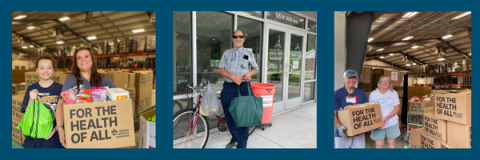
Food banks across the country are facing a new set of challenges. Cuts to key programs mean fewer of the staple items we typically receive, including perishable and nonperishable items, making it harder to stay ahead of the increasing need.
Summer is statistically a slower season for donations. Families are traveling, routines shift, and giving naturally dips. But this year the slowdown comes during a time of growing complications in how food banks receive and distribute food. Significant federal funding cuts are limiting both the variety and quantity of food available for distribution.
The USDA recently scaled back programs that help supply produce, proteins, and dairy to food banks nationwide. For organizations like Northshore Food Bank that rely on a mix of community donations, grants, and federal resources, that shift means some items we regularly count on just aren’t coming in. Nutritious staples like fruits, vegetables, meats, and eggs are arriving less often or not at all.
At the same time, we’re seeing more people turn to us for help. When school lets out, many families lose access to the free meals their children rely on, often leading to less consistent nutrition at home. Seniors living on fixed incomes are having a harder time making ends meet with rising grocery prices and out-of-pocket medical expenses. And we’re beginning to see more working parents reaching out for support, including some who have never needed help before.
Northshore Food Bank is doing what it takes to support families through our food assistance programs. We’re leaning on local partnerships, making thoughtful adjustments, and staying focused on making sure our food-insecure neighbors get the groceries they count on. As available resources shift, community support plays an even more important role in helping us keep up.
While a lot is changing for food banks right now, our focus hasn’t. With strong community support, Northshore Food Bank remains committed to our mission to ensure that every neighbor has access to the food they need.

